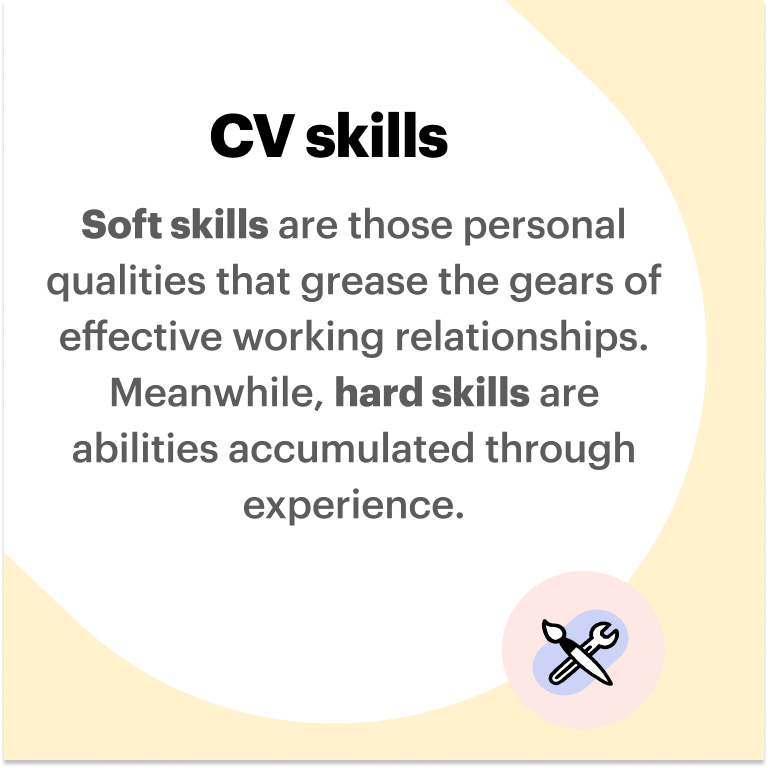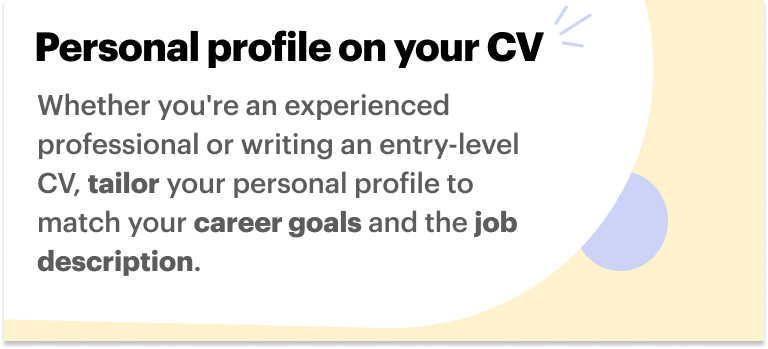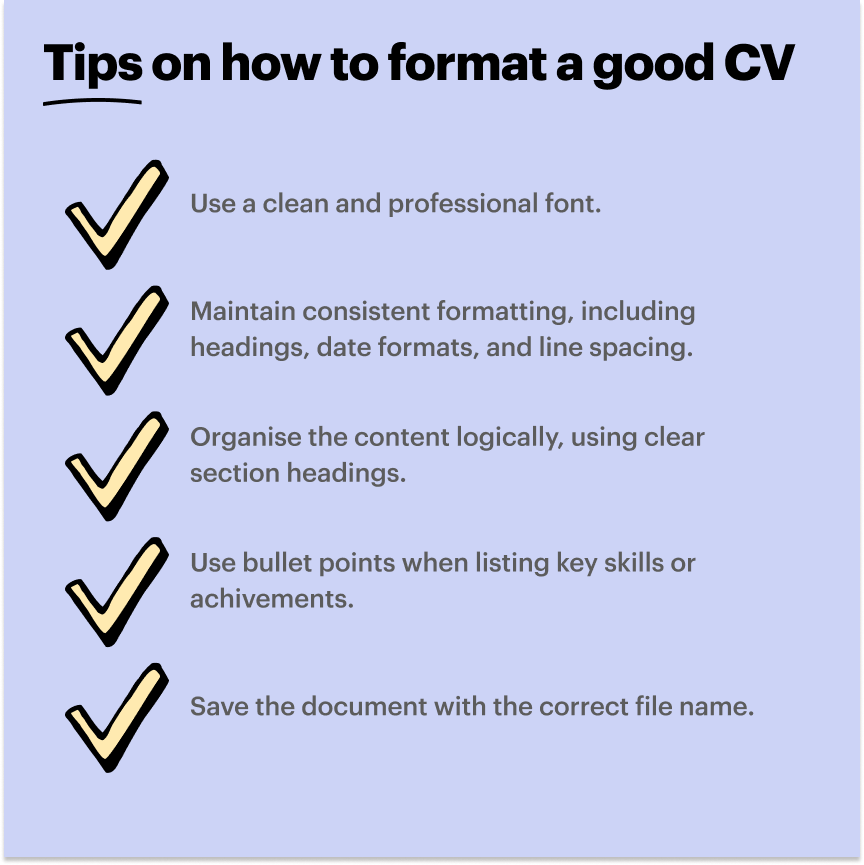
How to Write a Data Entry CV: Guide with Examples
Maintaining accurate and up-to-date information is central to running effective and efficient organisations. Data entry professionals perform an important role in inputting data, creating documentation and keeping databases current. The field of data entry has become increasingly open to remote working, providing flexibility and expanding opportunities for professionals everywhere.
We show you how to write a good CV for data entry roles across the UK. We also provide you with a ready-to-use CV template that is application tracking system (ATS)- friendly.
With a modern CV that brings your best abilities to the fore, you’ll be well-placed to secure one of the many data entry positions currently available in industries like finance, healthcare and the civil service.
In this article, we cover:
How to create a data entry CV in five steps.
Writing a data entry CV with no experience.
Must-have skills for a data entry job.
Best formatting for a data entry CV.

Data entry CV example

Using the Princeton CV template, Debrah creates an easy-to-follow CV giving each section space to draw the eye. This data entry examples gives a good idea of the applicant's speed, accuracy, and attention to detail, as well as highlighting relevant software skills and past achievements.
What to include in a data entry CV?
When beginning the CV writing process, start by sketching out the structure of your CV including the main sections in a logical order. For a data entry specialist, consider the following simple CV outline:
Personal details with an up-to-date contact telephone number and email address.
Personal profile highlighting your experience, motivations and core soft skills.
Education and additional certifications such as Microsoft Office Specialist Course.
Hard skills such as speed typing, database management and software knowledge.
Work experience with main duties and soft skills like organisation and attention to detail.
References upon request.

Data entry roles are found across diverse industries. To keep your applications job-specific, create a master CV you can customise later. This all-inclusive document containing your relevant skills, experience, education and certifications is not sent out to employers but acts as a time-saver when creating multiple consistent applications.
How to write a data entry CV with little to no experience
When starting a CV with little to no practical experience, emphasise transferable skills, academic achievements, seasonal work, and any relevant non-professional activities. Here's how to approach each section of your CV:
1. Personal profile
Create a compelling personal statement reflecting your keen interest in data management and commitment to developing as a data entry professional.
Highlight sought-after soft skills like a methodical mindset, strong organisational abilities and a keen eye for detail.
2. Emphasising transferable skills in work experience
Focus on part-time jobs, internships or volunteer work where skills relevant to data entry were utilised. For instance, any role requiring meticulous attention to detail, data handling, inventory management or administrative assistance.
Describe achievements and contributions to school projects or clubs where you managed information, organised events or handled scheduling and communications, showing your organisational and problem-solving skills.
3. Highlight personal and technical skills
Technical skills: List any software tools or systems you are familiar with that are relevant to data entry, such as Microsoft Excel, Google Sheets or specific database software.
Personal skills: Emphasise attributes like reliability, adaptability and precision. Mention scenarios where these traits were tested or demonstrated, such as during group projects or volunteer settings.
4. Educational coursework and projects
Detail your educational background, focusing on relevant subjects such as IT, business administration or mathematics.
Highlight specific projects or coursework that involved data processing, statistical analysis or software applications. This could be school projects where you analysed datasets, created reports or used spreadsheets.
Writing a CV for your first job? We've made it easy for you! Keep reading to discover more tips and examples to help you write a professional CV for a data entry job.

How to write a data entry CV: 5 steps with examples
1. What are the important skills to have on a data entry CV?
Having the right mix of hard and soft skills is a large part of landing an interview as a data entry professional. But it's not just about getting right skills on paper. Knowing how to list skills on a CV effectively is essential to making it to the next round.
Applicants with experience as a receptionist, office manager or secretary may identify some transferable competencies suitable to data entry such as time management, confidentiality and self-organisation.
If you are a student or recent graduate entering the workforce, focus on leveraging experience from your formal training or volunteer experience. This could include projects working with Excel, optimising an existing organisational process or keeping a home inventory.

5 essential skills for data entry professionals
Typing speed and accuracy: The ability to type quickly and accurately is fundamental in data entry to handle high volumes of data without errors.
Attention to detail: Ensuring the data entered is precise and error-free is critical, as even minor mistakes can lead to significant issues.
Computer literacy: Proficiency with computers, especially with database software and Microsoft Office (Excel, Word etc.), is necessary to enter and manage data efficiently.
Data analysis: The ability to interpret and check data for accuracy and consistency ensures the data's reliability.
Time management: Effective time management skills are needed to meet deadlines and manage various data entry tasks simultaneously without compromising quality.
Learn more about how to add computer skills to your CV.
Additional skills to add to your CV:
| Soft skills | Hard skills |
|---|---|
| Communication | Spreadsheet Proficiency |
| Organisational Skills | Database Management |
| Problem-solving | Data Cleaning |
| Adaptability | Software Knowledge (e.g., SAP, Oracle) |
| Teamwork | Information Processing |
2. How to write a personal profile for a data entry CV
Writing an effective personal profile on a CV is the best way to communicate your value as a data professional. This short but powerful paragraph underscores your level of experience, and core competencies like reliability, accuracy and efficiency, and outlines your motivations for data entry.

Examples of personal profiles for a data entry CV
Data Entry Specialist CV Personal Profile Example
Accomplished data entry specialist with over 3 years of experience managing extensive databases and interpreting complex datasets. Demonstrates a keen eye for detail and a strong command of data management software, including Ninox and Kintone. Highly organised, adept at setting and following established data entry standards and committed to improving data quality and accuracy through meticulous record-keeping and review.
Data Entry Operator CV Personal Profile Example
Dynamic data entry operator with 5 years of experience and skilled in rapid and accurate information input across various sectors. Excels in fast-paced environments, consistently achieving high data entry speeds without compromising accuracy. Proficient with the latest versions of Microsoft Office and Google Suite, bringing forth excellent organisational skills and the capability to handle multiple data streams effectively.
Data Entry Clerk CV Personal Profile Example
Reliable data entry clerk with 1 year of experience and a foundation in administrative tasks and a history of contributing to team efforts and organisational improvements. Expert in handling large volumes of data, detail-orientated with a high accuracy in data input. Equipped with solid skills in Microsoft Office applications and experience in customer service, ready to support company operations through effective data handling.
Refer to the admin CV example for more tips!
Data Entry Apprenticeship CV Personal Profile Example
Dedicated data entry apprentice actively developing data management and office administration skills. Solid foundation in IT user skills, currently applying knowledge in real-world settings under expert guidance. Possesses a strong commitment to learning and excelling in data entry tasks like database updates and report generation. Ready to develop professional capabilities further whilst supporting team objectives.
See here for more detailed information on writing a CV as an apprentice.
Data Entry Graduate CV Personal Profile Example
Recent graduate motivated to leverage academic knowledge in a professional setting. Proficient in database management, data cleaning, and using analytical software to support business decision-making. Adept at learning new technologies and processes, demonstrating exceptional adaptability and a drive to contribute effectively.
Refer to the graduate CV example for more insights.
Pro tip
When penning your personal profile, weave the soft skills mentioned in the job advert into your text naturally, setting the tone for your CV and introducing you as a good fit for the role.
Get ideas from related roles like IT, administrator or accountant and see how these other professionals approach the personal profile section. If you’re unsure which skills to include, read our sought-after soft skills article for more inspiration.
3. How to include practical data entry work experience
Knowing the best way to present your work experience on a CV is crucial. This section is where you showcase your history of relevant jobs and highlight how you applied your skills in various practical settings.
Including soft skills, such as communication, teamwork or problem-solving, can differentiate you from other candidates by showing your versatility and how you contribute to broader team and company goals. Always list your experience starting with the most recent job, using a clear and consistent format.
As with other information-orientated jobs like data analyst or librarian, it's important to detail what you did plus how well you did it, combining responsibilities with quantifiable achievements.

Data Entry CV work experience examples
Accounts assistant data entry | Store-To-Door Deliveries, Swansea | 2019 - Present
Responsible for maintaining accurate financial records and processing invoices through data entry systems. Managed complex datasets in financial software, ensuring up-to-date records aligned with accounting principles.
Processed over 1,000 invoices per month with a 99.5% accuracy rate, significantly reducing discrepancies.
Streamlined data entry processes, resulting in a 20% increase in productivity by implementing keyboard shortcuts and data validation techniques.
Data entry administrator | Hampshire County Council, Southampton | 2017 - 2019
Oversaw the entry and management of data across multiple systems, ensuring the accuracy and integrity of records. Collaborated with IT and administrative teams to optimise data quality and storage.
Successfully managed data for over 10,000 confidential accounts, maintaining comprehensive, organised and secure systems.
Implemented a new data backup system that decreased data retrieval times by 30% and improved data recovery processes.
Data entry clerk | Freddie Lobart Logistics, Wolverhampton | 2014 - 2016
Handled data input for logistics and shipping operations, including entering shipping and receiving information into the company database. Coordinated with warehouse and transportation departments to ensure accurate data flow.
Enhanced data entry accuracy from 94% to 99% through rigorous cross-verification with logistics reports.
Reduced entry backlog by 40% within the first year by introducing batch processing and prioritisation strategies.
Medical data entry | Privalab, Chelsea | 2012 - 2014
Input patient information, treatment records, and other medical data into hospital systems following strict confidentiality protocols. Supported administrative staff with data management related to patient care and hospital operations.
Achieved a data entry accuracy rate of over 98%, exceeding laboratory targets.
Played a key role in transitioning from paper-based to digital records, improving data retrieval speeds and patient service efficiency.
Data entry CV work experience example with little to no experience
If you are applying for data entry roles after a career change or as a school leaver, focus on transferable skills or any part-time work experience.
This example takes experience from a retail and sales position, emphasising transferable skills such as precision in data management, familiarity with digital tools and process improvement. This approach demonstrates to potential employers the ability to handle data-centric responsibilities effectively in a different context.
Retail sales associate | QRS Fashion, Nottingham | 2021 - Present
Responsible for managing inventory and sales transactions, emphasising accuracy in sales data entry and product tracking. Adept in various sales software systems, ensuring precise data on product availability and customer purchases.
Implemented a new labelling system that improved the accuracy of inventory tracking by reducing mismatches by 20%.
Boosted store efficiency by assisting in the rollout of a digital catalogue system, which shortened customer wait times by 30% during checkout.
4. How to include your education
Correctly formatting your education on a data entry CV validates your technical competence and foundational knowledge necessary for data entry roles. Employers typically look for structured education details highlighting relevant courses and certifications to support your skills and work experience.
Tips on how to format education:
Begin with your highest level of education and work backwards in chronological order.
List the degree or certificate name fully and the awarding institution.
Include the year of completion or write 'in progress' if you are yet to graduate.

University Degree: BSc Computer Science, University of Manchester, Manchester, 2016-2019
A-Levels: Holborn College | 2017 - 2022
Mathematics, English, Computer Science
GCSEs: Windham College | Norfolk, 2017 - 2022
9 GCSEs, including Mathematics and English grades A to C, including Maths (A) and English (B).
College Diploma: Level 2 Diploma in Business Administration, Imperial London, 2019
Pro tip
If space is tight on your CV or you hold a university degree or college diploma, list only your highest level of education.
5. How to format your CV for a data entry job
When formatting a CV for a data entry position, it's essential to present your data-handling skills clearly and concisely, reflecting the structured mindset required for such a role.

If you are wondering how long your CV should be, the ideal CV length for a data entry role is a one-page CV covering all necessary sections. Begin with personal details and profile at the top before succinctly outlining your education, work experience, skills and references.
The layout should employ a top-down linear approach, similar to that used in our Princeton or Otago templates, effectively showcasing the methodical skills vital for data entry professionals.
There is no single best colour for a CV. However, using colours strategically in areas like section headers enhances readability without overwhelming the layout. Consider greys, dark blues or neutral colours. When choosing a good font, select a professional and easy-to-read typeface like Arial or Calibri, with body text sized between 10 and 12 points.
Read more about how to improve your CV for maximum impact.
Key takeaways
Here are the broad strokes for creating a top-notch data entry CV:
Start with a master CV: Construct an all-encompassing master CV that includes all your skills, experiences and qualifications. Use this as a base to customise more specific CVs for each job application.
Craft a powerful personal profile: Your personal profile should be compelling, reflecting your dedication to data management and your ability to handle tasks meticulously. Incorporate relevant soft skills to portray yourself as an adaptable and detail-oriented candidate.
Clearly define skills: Distinguish between hard and soft skills by dedicating a specific section for hard skills such as typing speed, software proficiency and data management. Weave soft skills like organisation, communication and teamwork into your personal profile and work experience sections.
List work experience in reverse chronological order: Present your work history starting with the most recent position. This structure allows potential employers to quickly see your latest job roles and the relevant experiences you bring.
Correctly format your CV: Opt for a clear, professional layout that enhances readability. Limit your CV to an appropriate length - usually one or two pages depending on your experience. Use a simple yet effective font and subtle colours.
Next steps?
Iron out any creases using our intuitive CV builder with 20+ CV templates and professional designs. To accompany your CV, customise the short cover letter example to the specific data entry job application. Stay organised with tips on how to track job applications and use one of our templates if you're not sure how to send your CV via email. If you don’t want to leave anything to chance, connect with our professional CV Writing Service.
FAQ
Will data entry be replaced by AI?
AI increasingly automates data entry tasks, enhancing efficiency and reducing manual workloads. While the human aspect of data entry will be required, AI is changing the nature of these roles.
What is the data entry job salary in the UK?
Data entry job salaries in the UK vary, but the average salary ranges from £18,000 to £23,000 per year.
Can a beginner do data entry?
Yes, beginners can start in data entry as it generally requires basic software skills and attention to detail, making it an accessible entry-level position.
How much do you get paid for remote data entry in the UK?
Remote data entry jobs in the UK typically offer similar pay to traditional in-office roles, generally ranging from £18,000 to £23,000 annually, depending on experience and workload.
Is there a demand for data entry?
There is still a demand for data entry jobs, especially in sectors that require data input for analysis and decision-making processes. However, automation is reshaping the scope and skills needed for these positions.
What are the educational requirements for a data entry job?
Although completing a university degree or college diploma is recommended, not all positions specifically ask for one. In some cases, A-Levels or GCSEs are sufficient when applying for a data entry job.
Alternatively, completing a vocational course related to IT, such as a Level 1 Certificate for IT Users, Level 2 International Computer Driving Licence (ICDL) Certificate in IT User Skills, or a Level 2 Diploma in Business Administration, can also increase your employability.

